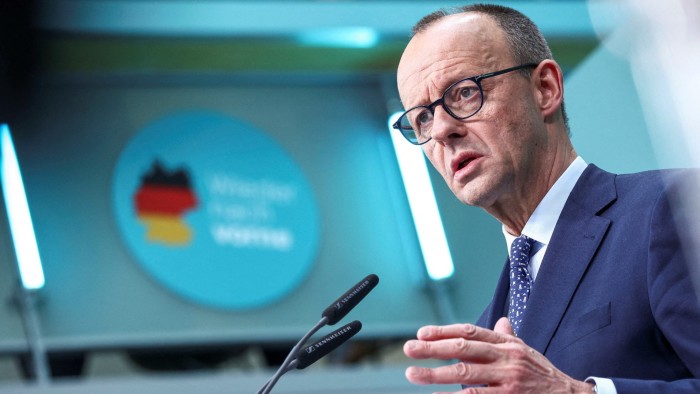Chancellor-in-waiting Friedrich Merz is wrangling with his future coalition partners and his own party over Germany’s strict borrowing rules, as he seeks to rush through a multibillion-Euro top-up to the defence budget before new MPs take their seats.
The discussions are likely to play a central role in exploratory coalition talks starting on Friday, as Merz seeks approval from the centre-left SPD to use the outgoing Bundestag to vote through the constitutional change required to boost military spending by more than €100bn. The highly unusual move is designed to bypass the blocking votes that the far-right and far-left will hold in the new parliament when its legislature formally starts in four weeks.
The far-right Alternative for Germany, which has secured a record 20.8 per cent of the votes in Sunday’s election, and far-left Die Linke, which won nearly 9 per cent, have opposed bending Germany’s strict debt rules to fund defence spending, and with more than one-third of the seats, they would be able to block the change that is required.
Merz, who leads the conservative CDU/CSU coalition that secured the most votes in the election, has sought to justify his rushed attempt to boost defence by depicting a historic “turning point” for Germany amid souring transatlantic relations since US President Donald Trump took office.
“It must be an absolute priority to strengthen Europe as quickly as possible to achieve independence from the US,” he said on election night.
His gamble has accelerated exploratory coalition talks with the Social Democrats, who have emerged as his only possible partners after he ruled out governing with the AfD. “The situation is so serious that it will speed up the coalition talks,” said a person close to Merz’s thinking. “It’s changing everything.”
But the brazen legislative offensive has rattled many across the political spectrum. Green politician Ricarda Lang said Merz’s U-turn on lifting the borrowing capacity had created a “mess”. He watched on as current Chancellor Olaf Scholz grappled with Germany’s debt rules, only to “suddenly say right after the election . . . ‘we also want the money’,” she told magazine Der Spiegel.
Finance minister Jörg Kukies, a Social Democrat, said it would send a “questionable political signal if constitutional amendments were now made with an old majority”.
Alice Weidel, AfD co-leader, said the idea was “electoral fraud” and accused Merz of “throwing all his election promises overboard on day one”.
The last time an outgoing parliament passed a law was in 1998, when then-chancellor Helmut Kohl convened an extraordinary session to approve air strikes on Serbia in the Kosovo conflict. But Armin Steinbach, professor at HEC, said Kohl “made a point in securing a very broad consensus among parties” and that it was not a change to the constitution.
The easiest option would be to amend the limit of the €100bn special defence fund set up under Scholz after Russia’s full-scale invasion of Ukraine in 2022. “They can just change the number,” said a person briefed on Merz’s thinking.
The chancellor-in-waiting is seeking support for his plan from all the mainstream parties in the outgoing parliament, according to the person, including the liberal Free Democrats who were voted out. “It depends on the Free Democrats and the Green Party,” the person added, suggesting that the Social Democrats had agreed on the plan in principle.
Several people with knowledge of the discussions have said that Merz was aiming for €100bn to €200bn in extra funding.
But by opening the debate over the country’s borrowing ability, Merz has also given way to growing calls, including from within his own party, for a relaxing of the debt rules for spending in other areas.
The SPD wants to secure a commitment from Merz to change the debt brake in the constitution. The clause, introduced under then-chancellor Angela Merkel in 2009, limits new federal borrowings to 0.35 per cent of GDP. While it can be relaxed in emergencies many economists believe it is too inflexible and no longer fit for purpose.
“There is an incentive for the SPD to back an increase in the special fund now only if Merz agrees to a larger reform of the debt brake to exclude investments in infrastructure,” said Henning Meyer, a Tübingen University professor close to the SPD.
A growing number of regional states are also pushing for a broader relaxing of the borrowing clause, which prevent them from taking on any new debt.
Stephan Weil, SPD premier of Lower Saxony, said he was open to using the outgoing parliament to increase defence spending but described it as a “patch up”. The CDU president of Schleswig-Holstein Daniel Günther called for a broader reform in the next legislature, with the support of Die Linke, which would approve a plan to boost investments in infrastructures.
The person close to Merz’s thinking suggested this could be on the table under the next parliament as part of a grand bargain with the states over a planned tax system overhaul.
“It’s only going to happen if you make a complete debt brake change including for the regional states,” the person said.
Merz this week did not rule out far-reaching reform. “On the subject of debt brake, I said several months ago that one can of course talk about many topics . . . It is too early today to give a final answer,” he said.
Asked about his plan to vote a €200bn top-up to the defence fund before the end of March, he suggested complex discussions were under way: “We’re talking to each other . . . I think it’s difficult right now, but as I said, there are talks going on.”
Read the full article here




